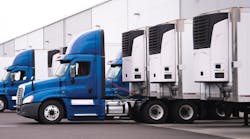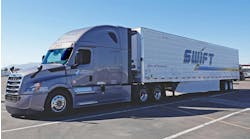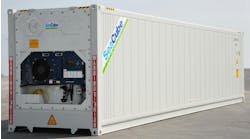Advances in refrigerated fleet management are heating up
With much emphasis placed on the tractor, the trailer can sometimes become an overlooked asset for a fleet. While neglecting the trailer is never a good idea, it is especially unwise when managing a fleet of refrigerated trailers. Thankfully, manufacturers of transport refrigeration units (TRUs) and trailers alike are finding ways to provide reefers that are not only safer and more productive, but also easier to manage and maintain.
The bottom line is that no fleet wants to see unscheduled service with any asset – especially a refrigerated trailer.
“The only time we want to see a TRU going into the shop is for a scheduled maintenance event,” says Tom Kampf, product manager for Thermo King, a provider of transportation temperature control systems.
Given that underlying objective, fleets should look at the various reasons a TRU might fail in the field. According to Kampf, the most common failure mode is a TRU that simply fails to start. The most common cause is an insufficiently charged battery.
Companies such as Purkeys offer battery recharging solutions to help guard against this common failure mode. The Purkeys SteadyCharge Accessory Battery Charger monitors and maintains an optimal charge level by preventing depletion during inactive periods. SteadyCharge is operational whenever tractor and trailer are connected. There is no need for additional cables because SteadyCharge simply uses a trailer’s existing 7-way cable.
Fleets and TRU manufacturers are also looking for other ways to prevent battery failure in the field. The harnessing of solar energy is an increasingly popular one.
Tapping into solar
In the case of Thermo King, solar panels have been offered as an aftermarket add-on for more than five years, and as an optional feature from the factory for the past two years.
“A solar panel is now one of the top five options ordered by our customers,” Kampf points out. “Our 30W solar panel can mount to either the trailer or the TRU itself. The solar panel helps keep the battery topped off so the TRU can restart after its off-cycle rest.”
Aside from being a relatively inexpensive way to help maintain sufficient TRU battery charge, fleets also like the fact that a solar charging panel is relatively straightforward in both operation and maintenance.
“Our TRUs have an integrated charge controller so we don’t overcharge,” Kampf explains. “Our solar panel system is also all 12V, so we thankfully don’t have to do anything to convert the power generated by the solar panel. Our solar panel is also designed to be a maintenance-free item. Outside of periodic inspections to make sure it’s free of debris buildup, there really is no maintenance to be done.”
Late last year, a London-based startup called Sunswap unveiled its first zero-emission TRU. The company says up to 50 percent of the energy needed for most trips is provided by solar. Sunswap’s TRU is completely solar/electric, with no reliance on an auxiliary diesel engine. A final environmental benefit is this TRU’s use of an ultra-low Global Warming Potential (GWP) refrigerant.
Telematics considerations with TRUs
Insufficient battery charge represents a more obvious failure mode for TRUs, but there are also a handful of other more inconspicuous problems that can arise. Kampf says telematics, an increasingly utilized technology, is helping fleets gain more insight into these types of issues.
“Up until a few years ago, when customers told us how their TRUs were failing, the data was somewhat anecdotal,” Kampf says. “We made the investment to make telematics a standard feature on all of our trailer units. This has allowed us to mine data off of our units – data that helps tell us which components are not operating as they should. Maybe it’s a buildup of ice on evaporative blowers, for instance. This helps us, as a manufacturer, make investments in areas that will help the fleet achieve higher utilization. Everything is becoming more data-driven, and a TRU is no exception.”
According to Bill Maddox, senior manager of product management for Carrier Transicold, more fleets are adding telematics systems to their refrigerated trailers. The trend toward telematics is being driven by not only a desire to increase utilization, but also to improve temperature control and help mitigate the potential human error associated with TRU management. Carrier Transicold provides a complete line of equipment for refrigerated trucks, trailers, and containers.
“Telematics such as Carrier Transicold’s eSolutions platform can help dispatchers quickly locate and place into service refrigerated trailers that are idle,” Maddox says. “Fleets can also monitor a trailer’s interior for temperature compliance during transit.
“Additionally, with two-way control, [the] eSolutions platform can enable temperature settings to be managed remotely, helping to remove the driver from the equation,” Maddox continues. “By remotely controlling refrigeration unit operation in accordance with the needs of the cargo or customer, the fleet provides greater accountability and allows the driver to focus on transporting the goods, rather than operating the refrigeration equipment. This may be especially helpful as fleets hire new drivers who may not have deep knowledge of refrigeration system operation.”
When telematics systems are applied to transport refrigeration systems, Maddox says there are additional ways a fleet can realize return on investment. Fuel consumption is a big one.
“When a fleet keeps a watchful eye on TRU operating modes used throughout the fleet, managers can optimize fuel efficiency by identifying opportunities for greater use of fuel-saving stop/start mode versus continuous-run,” Maddox explains. “Fleets can also track the extent to which their TRUs operate via electric standby when parked, helping to document the resulting fuel-cost savings. Also, centralized records generated on fuel consumption can be used to recoup direct costs through customer invoicing.”
Claims avoidance is another avenue for ROI, according to Maddox. Centralized oversight of temperature compliance helps in mitigating risk to refrigerated loads. Additionally, data recorded by the telematics system can easily validate and document temperature compliance from point to point.
In addition to utilization, temperature compliance, and fuel consumption, Thermo King’s Kampf says telematics captures hundreds of other TRU readings including valve placement, engine operation, blower speeds, and duty cycle of the compressor.
“A lot of this information is available to our dealers,” Kampf points out. “It gets a little trickier when you’re talking about fleet maintenance facilities because they are not tied into our system. That said, a fleet does have the ability to download data on a particular unit to study its previous operation history through a program called Service Watch.”
This could help a fleet identify when a certain parameter may be outside of a normal range, prompting a call to its Thermo King dealer for further diagnosis.
“This is really the key to telematics in general,” Kampf adds. “It is really that preventive or prognostic approach to maintenance that helps reduce the likelihood of a downtime incident.”
Options for executing preventive maintenance
Telematics helps fleets gain efficiencies in another big way. Managing TRUs and updating TRU software can largely be done wirelessly. That means technicians no longer have to spend time walking around the yard to service trailers.
“Efficiencies are gained through remote unit activation and setpoint management, automated pre-trip inspections, hands-free trailer precooling, remote software updates, and wireless data downloads,” Carrier Transicold’s Maddox says.
That is not to say that technology and telematics are on the verge of rendering the heavy duty service technician obsolete. There is still much to keep an eye on to ensure reliable, long-term performance of today’s TRUs.
Thermo King’s Kampf reminds that when it comes to preventive maintenance, there is no substitute for following the OE’s recommendations for a given product. That said, here is a rundown of some of the more essential preventive maintenance items a technician should be paying attention to.
Pre-trip inspections
It is always important to check the engine oil level, refrigerant level, antifreeze protection, and belt tension and condition. It is also a good idea to run a test on the microprocessor. Technicians should also regularly inspect the structural integrity of the TRU, searching for things like fluid leaks, loose or damaged parts, bearing wear, hose condition, etc.
Also, every 1,500 hours or so, give the TRU a good cleaning, including the condenser and evaporator coils, and remember to defrost the drains.
Engine
Every 1,500 hours, a technician should drain water from the fuel tank and check the vent, inspect/clean the electric fuel pump filter, and inspect/clean the EGR system. Every 3,000 hours, a technician should replace the air cleaner element and fuel filter/water separator. The engine oil and filter should also be changed, and the engine valve clearance should be adjusted. Every 4,500 hours or annually, a technician should check the engine mounts for wear. Finally, the coolant should be changed every five years or 12,000 miles.
Electrical
Every 1,500 hours, a technician should inspect the battery terminals and electrolyte level, as well as the wire harness for damage or loose connections. Every 4,500 hours or annually, a technician should inspect the AC generator and alternator wire connections.
Refrigerant
Every 1,500 hours, a technician should check the suction pressure, as well as the compressor oil level and overall condition. Every 4,500 hours or annually, check compressor efficiency and pump down the refrigeration system. It is also important to empty the oil collection container that is mounted on the compressor.
For fleets that would rather outsource TRU maintenance to a dealer, options exist to make the process easier. For instance, Thermo King’s Performance Advantage program offers a set of varying maintenance plans so a fleet can best match to its TRU servicing needs and budget.
Carrier Transicold’s Maddox says that next to the industry’s driver shortage, one of a fleet’s biggest challenges is finding qualified TRU technicians. Thus, more fleets are relying on TRU equipment dealers. Carrier’s BluEdge service platform provides three tiers of service through the North American dealer network to provide a variety of maintenance support, including emergency callout service, major component coverage, and extended warranties.
For fleets that also use the Carrier Transicold eSolutions telematics platform, refrigeration unit performance can be monitored collaboratively with Carrier Transicold dealers for a more seamless handling of service matters.
“For fleets that manage refrigeration unit service in-house, a telematics platform can be a virtual partner because of the equipment intelligence and insight it provides,” Maddox says. “Centralized monitoring can help build a comprehensive record of individual TRUs by tracking factors such as engine run-hours and other data collected by the TRU controller. This information can ultimately help fleets manage and coordinate maintenance cycles and better balance equipment usage.”
The ability to effectively manage refrigeration equipment while in transit is also enhanced with eSolutions. Before a driver is even aware of a potential service issue, a dispatcher can receive an alert and determine whether or not the issue is critical.
Keeping reefers clean is another important preventive maintenance step, and two new products have emerged that can help. The ISTOBAL HW’INTRAWASH can mount to either a loading dock or mobile platform. A telescoping head travels inside the trailer to deliver a high-pressure washing and food-safe sanitizing. The company says this system can reduce reefer cleaning time by 65 percent compared to traditional manual cleaning methods. According to the company, a 53-foot trailer can be cleaned within five minutes.
A company called Quali Systems has received a couple of patents for its unique reefer cleaning system. The system works within a trailer’s existing refrigeration unit, circulating ozone in the airflow to help sanitize the interior. Ozone is considered to be a highly effective antimicrobial disinfectant, and Quali’s systems produce ozone on site.
Evolving trailer designs
The TRU is not the only element of a refrigerated trailer that has been evolving. Design features that enhance thermal efficiency, improve safety, and reduce maintenance needs have been a focus of the trailer manufacturers themselves.
A little over a year ago, for example, Wabash National partnered with C&S Wholesale Grocers to develop a zero-emission refrigerated trailer with an entirely electric-powered TRU. The trailer features Wabash’s molded structural composite (MSC) technology, an advanced material consisting of a high-efficiency foam core that is encapsulated in a polymer-reinforced shell and protective gel coat. The company says MSC has several advantages, including an improvement in thermal efficiency by up to 30 percent. That improvement allows the fleet to extend runtime or downsize the batteries, if desired.
Another example of refrigerated trailer evolution is Stoughton's PureBlue. This trailer features several design elements to protect against air loss and water intrusion. For instance, the use of bonded side posts reduces the number of holes in the sidewalls, while a triple wiper seal door gasket helps block out the elements. Thanks to features like these, the refrigerated cargo is better protected, and so is the trailer interior itself.
Thermal efficiency has been an area of focus for refrigerated trailer manufacturers. For instance, Stoughton’s insulating process, use of high-strength composite material, and unique sealing and bonding techniques help ensure a more thermally efficient trailer.
“The platen foamed sides and roof ensure that the trailer is fully insulated in 360 degrees with no voids or uneven areas,” says Ted LeRoy, a product manager at Stoughton Trailers. “One of our biggest manufacturing investments is our foam wall press from a company called Iturrospe. Designed to insulate the trailer sidewalls, the press processes wall panels in a continuous pour mode, which provides a uniform, consistent foam fill. In addition, the composite framing, rear doors, and stringers in the floor are pulled together by an innovative, contemporary design that’s easy to repair using today’s standard methods.”
Successful management of refrigerated trailers comes down to two vital aspects: maximizing efficiency and protecting the cargo. Manufacturers of TRUs and the refrigerated trailers themselves are making advances to help a fleet achieve both of those objectives. Service technicians continue to play a vital role, as well, with an increasingly influential nudge from technology.



